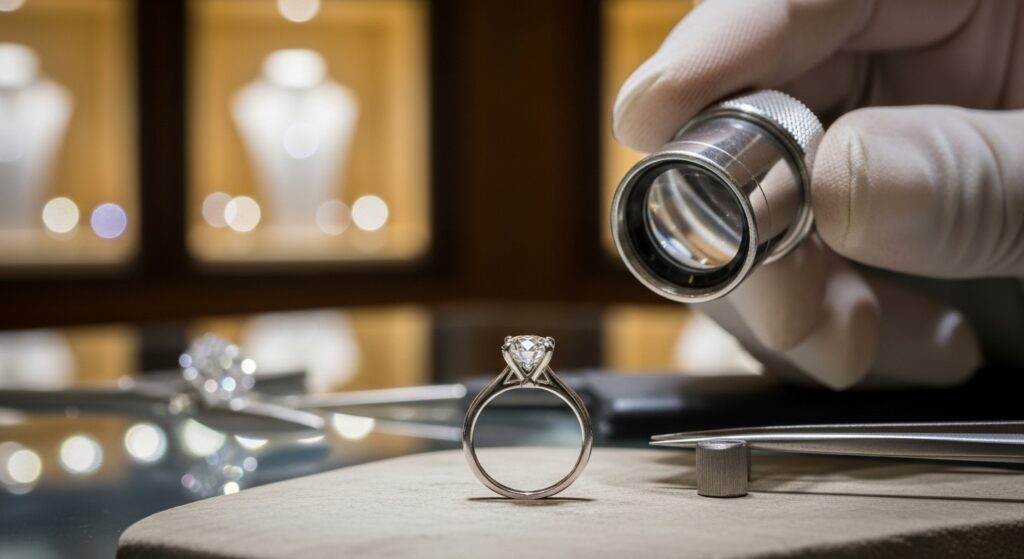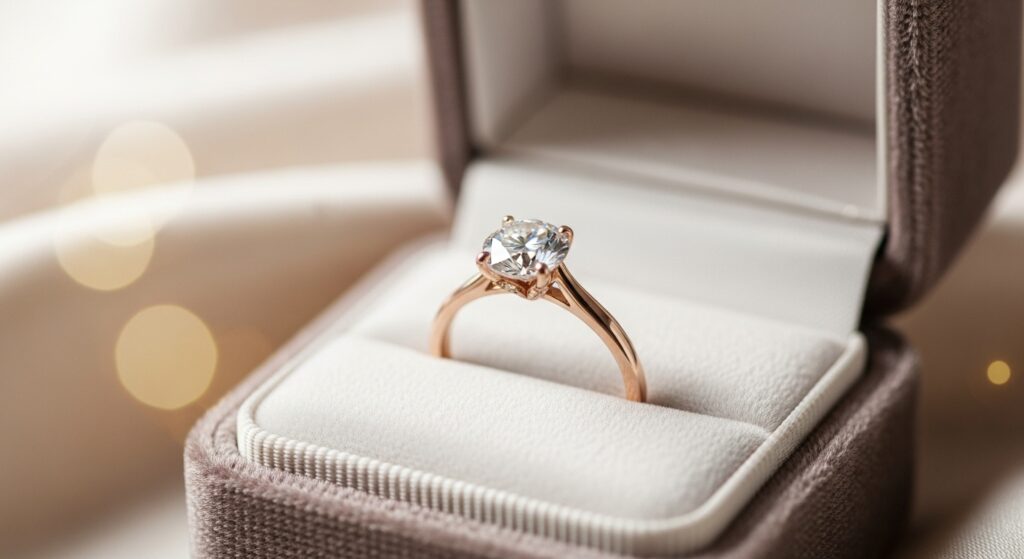Choosing an engagement ring is an exciting milestone, but it can also feel overwhelming. You’re navigating a world of new terms, from the 4Cs of diamond quality to choosing between lab-grown and natural stones, all while trying to find the perfect diamond ring within your budget. However, asking the right questions in-store can give you the confidence to compare options knowledgeably, sidestep common pitfalls, and ultimately protect your investment. We’ve put together a practical list to guide your conversation with any jeweller, ensuring you find a ring that meets and exceeds your expectations. Read below to learn more.
A Complete Checklist: Questions to Ask Your Jeweller
Here’s the complete list of queries you must ask when buying an engagement ring in toronto at a jeweller:
Can you clarify the fundamentals of this center stone?
This open-ended question asks the jeweller to describe the stone’s shape, size (in carats), and the four Cs: Cut, Color, Clarity, and Carat. The first step to making a wise choice is to understand these basics. The 4Cs determine how beautiful and valuable a diamond is, so it’s essential to work with a jeweller who takes the time to educate you, rather than just making a sale. Be cautious of vague phrases like “it’s a really nice stone” or individuals who fail to explain the 4Cs in simple terms.
Is this stone real, and what lab graded it?
An independent gemological lab issues a diamond certificate or grading report, which is an official document that lists the stone’s specific traits. The Gemological Institute of America (GIA) and the International Gemological Institute (IGI) are the labs that people trust the most. A certificate from a top-tier lab ensures that the diamond’s quality is accurately and objectively represented. This is important because standards can vary significantly from lab to lab. A reliable jeweller will be happy to give you documentation. They might say, “Yes, this diamond comes with a GIA report.” You can check the report number on their website. If a jeweller says they don’t need certification, only uses their own appraisal, or uses a grading lab you haven’t heard of, these are all red flags.
Can you tell me more about the metal and the setting?
The setting keeps your stone in place, and the metal you choose gives the ring its overall look and feel. Discuss the various setting styles, including prong, bezel, or halo, as well as the different metals available, such as platinum or multiple colors of gold (white, yellow, and rose). The metal affects the ring’s color, strength, and any potential allergies you may have, while the setting influences both its style and security. If a jeweller pushes you hard toward one metal without talking about the pros and cons for your lifestyle or budget, that’s a red flag.
What do you know about the origins and ethics of this stone and metal?
People are becoming increasingly interested in the origin of their jewellery, so don’t hesitate to ask the jeweller where the diamond came from and if they adhere to ethical sourcing practices. You want to ensure that the diamond you purchase is conflict-free and that the metals used to make it are sourced responsibly. If you get a vague, dismissive answer like “all diamonds are ethical now,” that’s a red flag.
What is the timeline and process for making a custom design?
You should know the timeline and process in advance if you’re ordering a custom ring. Custom work requires teamwork and patience, so setting clear expectations will help things go more smoothly and assist you in planning your proposal. Typically, the entire process takes 2 to 4 weeks. Red flags include unclear deadlines, being unable to review or approve designs along the way, or being pressured to commit before seeing a detailed model.
Could you please inform me of the final price and my options for staying within my budget?
It’s always a good idea to be clear about your budget in advance. A good jeweller will respect your budget and present you with the best options available within it, without trying to persuade you to spend more than you want. Choose a jeweller who is a partner in finding value, because hidden fees or a lack of transparency can make the final bill uncomfortable for everyone. If you only see rings that are too expensive for you or you can’t get a clear all-in price, these are clear signs that something is wrong. You could also ask if there are ways to achieve a similar look for less money, such as opting for a 14k gold setting instead of platinum.
Looking for a Jeweller Like No Other? Alex Armen at Solitaire Jewellery is at Your Rescue!
If you walk into a jewellery store with these questions, your experience will be seamless and empowering. With all these questions in hand, you are now ready to have a productive, confident conversation and find a ring that is not only stunning but also a wise investment that you understand.
Alex Armen at Solitaire x Alex Armen is the jeweller you should visit if you’re looking for someone who stands out from the rest. Alex has a unique blend of knowledge, personal attention, and a genuine desire to help clients make one of the most significant purchases of their lives. You can have confidence that your engagement ring journey will be effortless, informative, and truly memorable, thanks to his years of experience and excellent reputation. Alex ensures that every customer leaves feeling cared for and confident by explaining the various diamond options and suggesting settings that suit their lifestyle.
Frequently Asked Questions
Are diamonds grown in a lab a good choice for engagement rings?
Of course. Lab-grown diamonds have the same physical and chemical properties as real diamonds, but they can be more affordable. They are an excellent choice for buyers who want to get more for their money and be environmentally friendly.
What type of metal is best suited for individuals with sensitive skin?
If you have sensitive skin, platinum is an excellent choice because it is hypoallergenic. If you prefer gold, look for options with a higher karat, such as 18k. These have fewer alloy metals that could cause reactions.
How can I determine if a diamond is genuine and comes from a reputable source?
Obtain a certificate from a reputable gemological laboratory, such as GIA or IGI, which can confirm the diamond’s authenticity and details.


